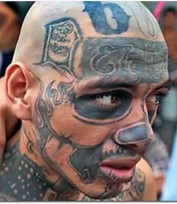%excerpt%
Enforcement / ICE / DHS
Border Patrol Raids Camp in Retaliation Against Humanitarian Aid Workers

The United States Border Patrol raided a humanitarian aid camp in Arizona on July 31, detaining volunteers and over 30 people receiving care. The camp—known as Byrd Camp—is run by No More Deaths (NMD), an organization that works to end the death and suffering of people crossing the U.S.-Mexico border. The raid follows a,
The United States Border Patrol raided a humanitarian aid camp in Arizona on July 31, detaining volunteers and over 30 people receiving care.
The camp—known as Byrd Camp—is run by No More Deaths (NMD), an organization that works to end the death and suffering of people crossing the U.S.-Mexico border. The raid follows a pattern of retaliation against humanitarian aid and criticism of the Border Patrol.
The Border Patrol’s Raid
As the sun set, an armored vehicle, three ATVS, two helicopters, and at least 24 marked and unmarked vehicles descended on Byrd camp in over 100-degree weather. The camp has provided humanitarian aid in the Sonoran Desert near Arivaca, Arizona since 2004.
The raid included the Border Patrol Tactical Unit (BORTAC), the agency’s SWAT-style team. This is the same team that recently cracked down on protesters in American cities. Agents chased and arrested undocumented individuals who had been receiving medical care and other aid at the camp.
Unmasked agents shouted and pointed rifles at volunteers, whose hands had already been zip tied behind their backs. The agents cut open and ransacked tents, searched vehicles, and disconnected power from the well.
A warrant, which agents refused to show at the beginning of the raid, targeted documents and electronic devices. They confiscated camp medical documents and phones, preventing volunteers from documenting the event. A Border Patrol cameraman, however, filmed the event.
Border Patrol also brought a cameraman. He filmed the scene as agents chased and arrested people who had sought out humanitarian aid and respite from the 100 degree heat.
More photos and footage exist, but phones are still in custody. pic.twitter.com/2v2VSMWvz8
— No More Deaths (@NoMoreDeaths) August 2, 2020
The day before the raid, Border Patrol agents entered the camp without a warrant and detained one undocumented woman. From that time on, agents kept the camp surrounded. They required volunteers to pass through checkpoints to enter and exit.
Border Patrol’s History of Retaliation Against Humanitarian Aid Workers
This recent raid continues a history of retaliation against No More Deaths. In 2017, agents raided Byrd Camp, violating a written agreement from 2013 between the organization and the Tucson Sector Border Patrol for the first time. That agreement recognizes the camp as a medical facility as defined by the International Red Cross. Those facilities are off-limits for government interference.
Border Patrol and BORTAC arrested people receiving care and ransacked the humanitarian aid station, ripping apart tents and destroying medical supplies. pic.twitter.com/jb5Ov4RwVJ
— No More Deaths (@NoMoreDeaths) August 2, 2020
In 2018, NMD published a report on Border Patrol’s interference with humanitarian aid. The organization asked advocates to call the Tucson Border Patrol Station with their criticism. Hours later, agents raided Byrd camp again. This time, they arrested volunteer Scott Warren and two undocumented men.
In 2017 and 2018, the federal government brought charges against a total of nine NMD volunteers related to their humanitarian aid work. The only convictions (for entering a wildlife refuge without a permit and abandoning property (e.g., water and food)) have since been reversed.
Two days before the recent raid, NMD had released evidence related to the 2017 raid obtained through a Freedom of Information Act request. The documents showed that BORTAC had advised on the raid, and that a leader of the Border Patrol union pressured agents to proceed quickly without a warrant.
“Items” to be seized included human beings. Think about that for a second. https://t.co/bGFyqJZzSA
— Nicole Hallett  (@HallettNicole) August 3, 2020
(@HallettNicole) August 3, 2020
Greg Kuyendall, an attorney who represented Scott Warren, responded to the recent display of enforcement stating:
“…Humanitarian aid camps are recognized as a basic good and a thing that needs to be provided, normally by either NGOs or governments themselves, and they’re absolutely off-limits from law enforcement. That’s well-established in the International Red Cross guidelines, as well as the United Nations’ guidelines…Every organization that deals with refugees and people that are in crisis situations, whether they’re manmade or not, understands that humanitarian aid stations cannot be places where law enforcement is allowed to go hunting.”
There was no need for the Border Patrol to raid Byrd Camp, especially using paramilitary force during a pandemic. Such actions serve only to retaliate against human rights organizations and intimidate citizens from providing humanitarian aid. No More Deaths’ aid work should be decriminalized and protected.
Source: Border Patrol Raids Camp in Retaliation Against Humanitarian Aid Workers
, 
Courts / Judicial
Federal appeals court overturns ban against immigration arrests at Massachusetts courthouses

A three-judge panel of the US Court of Appeals for the First Circuit Tuesday overturned a ban prohibiting US immigration authorities from arresting undocumented immigrants at courthouses in Massachusetts. In 2018, US Immigration and Customs Enforcement (ICE) formalized a policy of attempting to arrest undocumented immigrants when they appeared at state courthouses for judicial,
A three-judge panel of the US Court of Appeals for the First Circuit Tuesday overturned a ban prohibiting US immigration authorities from arresting undocumented immigrants at courthouses in Massachusetts.
In 2018, US Immigration and Customs Enforcement (ICE) formalized a policy of attempting to arrest undocumented immigrants when they appeared at state courthouses for judicial proceedings. Two Massachusetts district attorneys, the public defender’s office and a non-profit immigrant advocacy organization filed a lawsuit against ICE and asked for a preliminary injunction against the practice. They claimed that ICE was in violation of the Immigration and Nationality Act (INA) and lacked authority to make civil arrests at courts. The district court agreed, and granted an injunction last year.
At issue is a claim that the INA implicitly incorporates a common law privilege that protects those attending court from being subject to civil arrest. While nothing in the text of the INA prohibits these types of courthouse arrests, the plaintiffs argued that the law must be read in light of the nonderogation canon, a method of statutory construction that holds that courts must assume Congress is aware of long-standing common law principles and, absent express language to the contrary, intends to keep them.
Judge Bruce Selya wrote Tuesday that “the nonderogation canon does not give courts carte blanche to read a grab bag of common law rules into federal statutes simply to effectuate what those courts may perceive as good policy.” The circuit court held that the nonderogation canon applies if the facts of the common law rule and the statute in question are sufficiently analogous. The common law prohibited civil arrests at court by private litigants, while here the arrests are being carried out by a government agency. The panel vacated the preliminary injunction and remanded the matter back to the district court.
Rachael Rollins, district attorney for Suffolk County and one of the plaintiffs in the case, said in a statement that “this fight is far from over” and that the plaintiffs “are absolutely on the right side of justice here.”
The post Federal appeals court overturns ban against immigration arrests at Massachusetts courthouses appeared first on JURIST – News – Legal News & Commentary.
Source: Federal appeals court overturns ban against immigration arrests at Massachusetts courthouses
,
Enforcement / ICE / DHS
Traffic From Mexico Blows Through U.S. Travel Restrictions

President Donald Trump’s ban on “non-essential” border travel isn’t slowing down traffic coming from Mexico. Since the March 20 order was extended to Sept. 21, volumes have increased and sharply in some areas. San Ysidro, the busiest port of entry in California, saw a 72 percent rise in northbound pedestrian crossings from April to July.,
President Donald Trump’s ban on “non-essential” border travel isn’t slowing down traffic coming from Mexico. Since the March 20 order was extended to Sept. 21, volumes have increased and sharply in some areas.
San Ysidro, the busiest port of entry in California, saw a 72 percent rise in northbound pedestrian crossings from April to July. The number of private vehicle passengers rose 62 percent, and the number of private vehicles increased 47 percent.
Pedestrians and private-vehicle passengers coming through San Ysidro combined for a total of 1,693,338 crossings in July, compared to 1,031,906 in April.
El Paso, the biggest border crossing in Texas, recorded a whopping 220 percent increase in pedestrians from April to July. Vehicle passenger counts were up 106 percent, with the number of vehicles climbing 79 percent.
Pedestrians and vehicle passengers at El Paso combined for 963,457 crossings in July, compared to 419,046 in April.
The tallies by the U.S. Department of Transportation include individuals who enter the country multiple times per month. The crossings may or may not be “essential”; U.S. Customs and Border Protection has not reported how many people are turned back.
But following a pattern FAIR reported on last month, entries into this country are increasing substantially at the southern border, even as Americans remain under coronavirus restrictions.
U.S. ambassador to Mexico, Christopher Landau, cited five- and six-hour delays at ports of entry as border agents focus on “essential travel.” He said many were crossing to shop, dine and visit families. “Such irresponsible behavior is exacerbating the health crisis,” he said.
Border counties in Texas have reported spikes in COVID cases and hospitalizations. Officials in Starr and Hidalgo counties started imposing curfews and voluntary stay-at-home directives in July, urging that non-essential business activities be curtailed or suspended.
Yet despite presidential edicts and local pleas, border traffic keeps building. At current rates, crossings will be back to pre-COVID levels by the time the administration’s non-essential travel ban expires — if they’re not already.
Source: Traffic From Mexico Blows Through U.S. Travel Restrictions
,
Enforcement / ICE / DHS
Institutional Racism Is Rampant in Immigration Enforcement at the U.S.-Mexico Border

A Black former U.S. diplomat recently shared her experience of months of racial profiling by U.S. Customs and Border Protection (CBP) officials while she was stationed at the U.S. Consulate in Ciudad Juárez, Mexico. She was tasked with enforcing U.S. immigration law, but nevertheless found herself racially profiled and discriminated against by U.S. immigration,
A Black former U.S. diplomat recently shared her experience of months of racial profiling by U.S. Customs and Border Protection (CBP) officials while she was stationed at the U.S. Consulate in Ciudad Juárez, Mexico. She was tasked with enforcing U.S. immigration law, but nevertheless found herself racially profiled and discriminated against by U.S. immigration authorities.
The problem became so severe that she now suffers from post-traumatic stress disorder and had to quit her job. Unfortunately, this is just one example of immigration officials’ long history of racism at the border.
CBP Racially Profiles a U.S. Diplomat
In 2018, Tianna Spears was a new diplomat stationed at the U.S. Consulate in Ciudad Juárez, Mexico. She frequently crossed the border into El Paso, Texas, as thousands of other U.S. citizens do every day. However, she soon found that she was treated differently than others by CBP officers at the border.
Spears estimates that CBP officers required her to go through “secondary inspection” approximately two out of every three times that she crossed. This outcome should have been extremely rare given her diplomatic passport and SENTRI card allowing for expedited clearance. Her non-Black colleagues never had similar experiences.
Spears repeatedly raised the issue to CBP and her consulate supervisors, but the situation only worsened. She reports that CBP officers sometimes did not believe she was a diplomat and accused her of stealing her car. Their questioning was aggressive and threatening.
The mental health effects of the harassment eventually forced her to leave her job and return to the United States.
CBP Has a Long History of Racism
There is a long and documented history of immigration officials engaging in racial profiling and harassment at ports of entry.
Throughout the first half of the 20th century, Mexican citizens crossing into El Paso had to undergo a delousing process. CBP officials stripped them, shaved their heads, and forced them to take a bath in gasoline. This discriminatory process was based on a stereotype that Mexicans were dirty and diseased.
Much more recently, the Office of the Inspector General found that CBP improperly retaliated against one of their officers that reported misconduct he observed within the agency. The officer stated that CBP was disproportionately targeting Black drivers for further inspection at the ports of entry between Detroit, Michigan and Windsor, Canada.
But CBP’s history of racial profiling is not limited to people crossing the border. The agency also has the power to stop and question people within 100 miles of borders or coastlines. Approximately two-thirds of Americans live within this area, which is sometimes called the Constitution-free zone.
Border Patrol Targets People Who “Look Mexican”
CBP’s activities within the border zone are performed by one of its component agencies, the Border Patrol. The Border Patrol has targeted border residents appearing to be of Mexican descent for almost 100 years. Throughout that time, people going about their daily lives near the border have been racially profiled, stopped, and interrogated—regardless of U.S. citizenship or immigration status.
In 1975, the Supreme Court ruled that “Mexican appearance” could not be the sole reason a roving Border Patrol officer stopped someone. It could, however, be a “relevant factor” in deciding whether to do so.
The Border Patrol runs permanent and temporary checkpoints on roads leading away from the border. A 2015 American Civil Liberties Union report Guilty Until Proven Innocent revealed that CBP officers working at checkpoints racially profiled and even interfered with the medical care of border residents.
Residents of Arivaca, Arizona conducted observations of the checkpoint at the entrance to their community. Latino-occupied vehicles were more than 26 times more likely to be required to show identification while passing through the checkpoint.
In 2014, the Department of Justice modified its guidance on officers discriminating based on race or ethnicity. Previous loopholes gave law enforcement permission to discriminate. However, other loopholes remain, including some for CBP activities at or near the border.
Stories like that of U.S. diplomat Spears serve as examples of the historical and institutional racism within CBP and the U.S. immigration system more broadly. We need increased transparency and oversight to force cultural changes within CBP. These significant changes are necessary to prevent further injustices and ensure the Constitution applies equally to all people.
Source: Institutional Racism Is Rampant in Immigration Enforcement at the U.S.-Mexico Border
,
-

 Un6 years ago
Un6 years agoPERM Process Flow Chart
-

 Enforcement News15 years ago
Enforcement News15 years agoFake ID Makers Arrested In Dallas
-

 BREAKING5 years ago
BREAKING5 years agoPERM Recruitment Advertising, How It Works.
-

 Today's News13 years ago
Today's News13 years agoImmigration: Gangster Tats = Visa Denied
-

 BREAKING6 years ago
BREAKING6 years agoUSCIS Statement Throws Constitution Out the Window
-

 BREAKING3 years ago
BREAKING3 years agoHouse Republicans push asylum restrictions, border security
-

 BREAKING4 years ago
BREAKING4 years agoDeSantis parts with Trump in response to Surfside tragedy
-

 BREAKING3 years ago
BREAKING3 years agoBiden is ignoring immigration issues, voters say in poll





